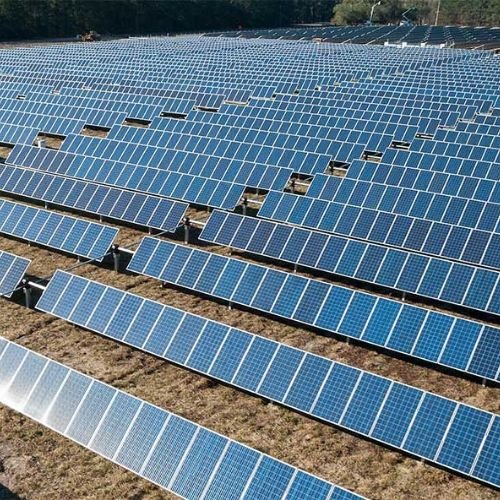Rooftop Solar PV System
A rooftop solar photovoltaic (PV) system is a sustainable and increasingly popular means of generating electricity by harnessing solar energy using photovoltaic cells mounted on rooftops. This technology allows individuals, businesses, and communities to produce clean and renewable electricity directly from sunlight, reducing their reliance on traditional fossil fuels and contributing to a greener future.
Here’s an overview of how a rooftop solar PV system typically works:
- Solar Panels: The system comprises solar panels, which are composed of multiple photovoltaic cells. These cells convert sunlight into direct current (DC) electricity through the photovoltaic effect.
- Inverter: The DC electricity generated by the solar panels is then passed through an inverter. The inverter converts the DC electricity into alternating current (AC) electricity, which is the standard form of electricity used in homes and businesses.
- Electricity Usage: The AC electricity produced by the inverter can be used to power electrical appliances, lighting, and other devices within the building. If the system generates more electricity than is currently being used, the excess electricity can be exported to the grid or stored in batteries for later use.
- Grid Connection (Optional): Many rooftop solar PV systems are connected to the electrical grid. This allows users to draw electricity from the grid when their energy demand exceeds what their solar panels can produce, and to export excess electricity to the grid when their panels generate more than they need. This process is often facilitated through net metering arrangements, where users receive credits or payments for the electricity they export to the grid.
- Battery Storage (Optional): Some rooftop solar PV systems incorporate battery storage to store excess electricity generated during sunny periods for use during times when sunlight is not available, such as at night or during cloudy days. Battery storage can help increase self-consumption of solar energy and provide backup power in the event of grid outages.
Benefits of Rooftop Solar PV Systems:
- Renewable Energy: Rooftop solar PV systems generate electricity from a renewable energy source—sunlight—reducing reliance on fossil fuels and lowering greenhouse gas emissions.
- Cost Savings: By generating their own electricity, users can reduce their electricity bills, especially in areas with high electricity prices or favorable solar incentives.
- Energy Independence: Solar PV systems provide a degree of energy independence by allowing users to generate their own electricity on-site, reducing dependence on centralized power plants and the electrical grid.
- Environmental Benefits: Solar energy is clean and produces no air or water pollution during operation, contributing to improved air quality and environmental sustainability.
- Low Maintenance: Solar PV systems typically require minimal maintenance, with most components having long lifespans and warranties.


